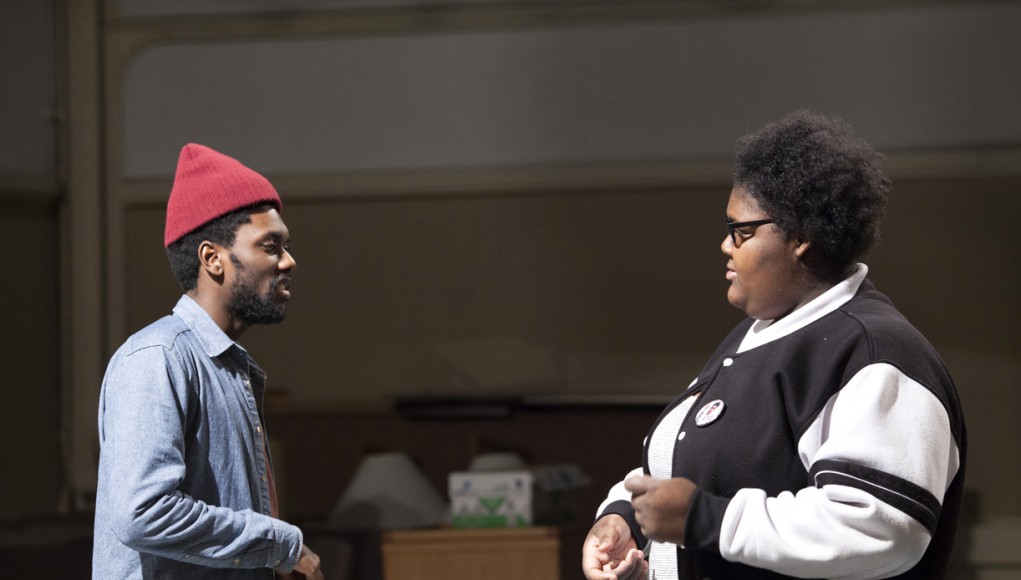The creators of We the 350: Stories of Poverty, Racism, and Incarceration in Wisconsin hope that their production that is being featured at the Overture Center this weekend will appeal to audience members viscerally and deepen community conversations around racial disparities, incarceration, and poverty.
We the 350 is a narrative-based performance that paints a compelling picture of what the intersections between racism, poverty, and disparate incarceration rates for Wisconsin’s black population look like in someone’s daily life. The play draws from real-life experiences of black people in Madison and Milwaukee.
“What I really think is amazing about this performance is its ability to reach different audiences at the same time,” says Sara McKinnon, UW-Madison assistant professor in communication arts and co-director of We the 350. “So, one of our goals was to make sure that when black audience members come to the performance and see some of these stories that it hits home with them and they are like, ‘That happened to me, too!’ That’s a really powerful moment in performance.”
For others, We the 350 can provide that moment where they ask themselves: What does poverty look like in our community or what is the relationship between poverty and incarceration?
“We do live in a predominantly white city and we do have terrible racial disparity numbers so we are also looking to reach white audience members and hopefully inspire change in our community,” McKinnon tells Madison365. “We need white audience members to see what’s going on and I think this performance does a good job giving story to the statistics we hear so much about. I think that there are real possibilities to motivate and energize white audiences on this issue.”

We the 350 explores the ways that state structures rely on intersections between race and class, along with many other intersections, to maintain racially disparate arrest and incarceration rates in Wisconsin. “I think it’s really key as we talk about structures of racism and poverty as they exist in our community that we have to understand that these are intersecting structures and that plays out in intersecting ways in people’s lives,” McKinnon says. “The performance tries to get at those intersections and show what that looks like.”
The “350” in We the 350 represents the disproportionate amount of poor African-Americans incarcerated in Dane County. McKinnon co-wrote and co-directed the performance along with T. Banks, a recent UW graduate and core member of the Young, Gifted, and Black Coalition.
“T has a background in performance; he was a First Wave scholar at UW-Madison and I’ve seen his performances. They were great. My background is in performance studies and one of things we do a lot is theater to address social issues,” McKinnon says. “T and I got talking one day and we realized what an opportunity we had here to use the stage and use performance to reach audiences in Madison about racial disparities, poverty, and incarceration in our city.”
The two figured that a great way to put a performance together would be to center it around real people’s stories. Over the summer, they did seven interviews with activists who related their life stories living in Wisconsin around the subjects of poverty, incarceration, racism, and their relationships with the police. “The interviews took up 400 pages of single-spaced data,” McKinnon said. “There was just so much. The interviews were so rich.”
As they delved deeply into those interviews, it became apparent right away that there was overlapping themes across all of the narratives. “We pulled out those narrative snapshots to look closely at those themes,” McKinnon says. “What does it mean to be a person of color living in a predominantly white city? What is like to interact with the police? Our task was to tell stories that give parallels to things we know about racial disparities in our city.”
The Wisconsin Council on Children and Families’ Race to Equity report showed that black residents in Dane County were almost 5.5 times more likely to be jobless than their white neighbors. Also, blacks were 43.5 percent of new prison placements despite accounting for only 4.8 percent of the county population. The report also found deep disparities in poverty, student achievement, and juvenile and adult arrests.
“There’s a lot of powerful statistics coming from the Race to Equity report, but sometimes with that stuff you read it and it doesn’t stick with you. Stories that you can see do stick with you,” McKinnon says. “It creates a connection and it allows you to understand what it feels like to be in that person’s shoes.”
The all-black cast of We the 350 includes Sean Avery, Matthew Lewis, Jurie Mayo, Rebecca Tillman, Devon Webb, and Chelsea Whitaker. This event is sponsored by the Young Gifted & Black Coalition, UW-Madison’s Comparative US Studies, and Overture Center’s Community Arts Access Program.

A grant from Overture Center’s Community Arts Access Program funded the space for the performance. For now, it’s a one-time event for the Overture Center, but McKinnon says that she is open to doing it elsewhere in the future.
“The idea with our scripting and staging is that we could do it again,” she says. “It’s a very bare-bones performance and I feel like it’s something we could do at high schools and be used as a community education piece. We have interest from some groups around the city so I think there will be more performances.”
Audience members should be advised when thinking about bringing kids that the show includes narratives describing physical, mental, and sexual violence.
“I hope, in the end, that this performance gives the audience a sense of why racial disparities is something that they should be fighting against and working alongside black organizers, as well, and really just supporting black leadership on these issues,” McKinnon says.
We the 350: Stories of Poverty, Racism and Incarceration in Wisconsin will be held Nov. 7-8 at Overture Center for the Arts. For more information, click here.
































